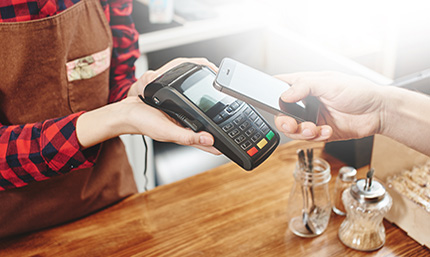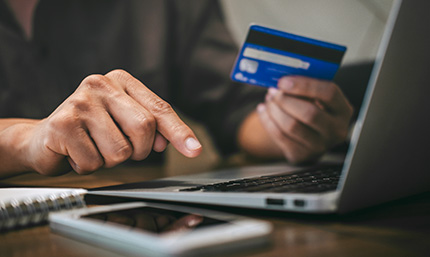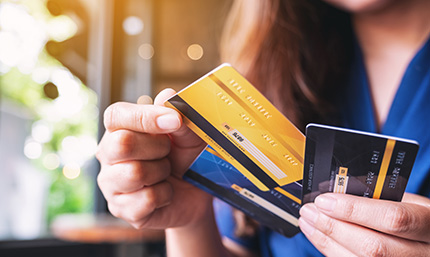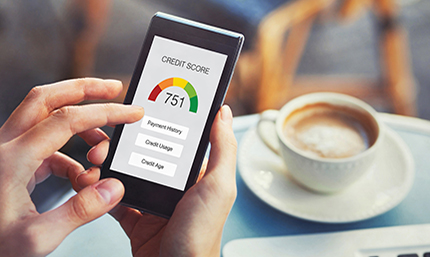News & Tips
What are Secured Credit Cards?

Maybe you’ve run into the following paradox: How do I get a credit card with less-than-perfect credit (or no credit) if I need a credit card to build my credit? You’re in luck because secured credit cards break this cycle! They’re one of the best credit-building credit cards because they can help lay a more solid credit foundation or resurface a sinking score.
Here at Space Coast Credit Union, we’re dedicated to helping our members in any way we can. We offer a Visa® Secured credit card, which can help get you one step closer to achieving your financial goals. Keep reading for the full 4-1-1 on secured credit cards. And no worries, it looks just like a regular credit card, so no one else will know that it’s secured but you (and the issuing lender).
What is a Secured Credit Card?
Secured credit cards work just like credit cards, but they’re tied to a refundable security deposit that the borrower pays. This deposit is collateral for the lender, making these cards less risky to issue to people with low or no credit. The required deposit amount varies by lender and could be anywhere between $200 and $2,500, and this amount usually equates to the credit line limit for the card. If the borrower defaults, which means to become severely delinquent on their credit card payments, the lender will “dip” into that deposit to cover the balance. And no sweat, if you close a secured card that no longer has a balance, the lender will return your deposit!
Secured vs. Unsecured Credit Card
What’s the difference between a secured and unsecured credit card? Because secured cards have a deposit as collateral, they’re like “training wheels” in a sense. The purpose of these cards is to help borrowers manage their balance and improve their credit.
Most credit cards are unsecured, meaning they’re not tied to any collateral. Borrowers will usually need to meet certain credit requirements in order to get approved for these cards, as lenders will look at this information beforehand.
With better credit, secured credit card holders have a greater chance of graduating to an unsecured credit card. For example, after one year of good payment history at SCCU with a Visa® Secured credit card, you’re eligible to apply for a Visa® Platinum credit card. Learn more about how to choose the best credit card to fit your needs here.
Also, the rates for secured and unsecured cards can vary greatly. See our credit card rates here.
No Credit vs. Bad Credit: What’s the Difference?
Many people who apply for secured credit cards do so because they have no credit and want to establish it, or they want to improve their credit. First, it’s important to distinguish the difference between no credit vs. bad credit:
No Credit
No credit means that the three credit bureaus (Experian, Equifax, and TransUnion) don’t have information about your credit history—most likely because you haven’t taken out a loan or a credit card, which is what makes up a credit report. Lenders typically look at a loan or credit card applicants’ credit reports to determine how much of a “risk” they are. Without a credit report, it’s hard for applicants to get approved.
Bad Credit
So, what’s bad credit? “Bad credit” is a pretty relative term, but it usually means that a borrower’s credit report has some blemishes, and the credit score is less than ideal for many lenders. However, the minimum credit score a borrower needs will vary by loan type, credit card, and lender. All is not lost! Borrowers can get their credit score back on the right track with the right steps.
FICO® Credit Scoring System
Lenders use a variety of credit scoring systems, depending on the loan amount, type of credit request, etc. Let’s take a look at one of the most common scoring systems, which is FICO® (Fair Isaac Corporation). FICO® calculates your credit score—a three-digit number—based on your payment history, amount owed, length of credit history, new credit, and a mixture of the types of credit you have on your credit reports.
FICO® categorizes credit scores in the following way:
- Exceptional: 800-850
- Very Good: 740-799
- Good: 670-739
- Fair: 580-669
- Poor: 300-579
It’s important to note that having a credit score below the “good” range doesn’t necessarily mean that a lender will disqualify you for a loan or credit card, but it could mean you need a co-signer to avoid a higher interest rate.
What are the Benefits of Improving Bad Credit?
The benefits of establishing or improving credit usually entail an easier time qualifying for higher loan amounts, better interest rates for loans and credit cards, more negotiating power, lower insurance policy premiums, lower deposits for renting apartments, and more. Ultimately, this all means that you could save hundreds, if not thousands, of dollars overall.
How Does a Secured Credit Card Work?
Let’s say the day has finally arrived: You get your secured credit card in the mail. Hooray! Now you can employ that piece of plastic in person and online wherever credit cards are accepted. But wait, how does a secured credit card help you build credit?
- It’s a good idea to only use it a couple of times a month for small purchases. While an Amazon shopping spree might cross your mind, remember, the goal is to use this card responsibly to improve your credit score.
- Like with any credit card, you’ll still get a monthly statement with the balance, minimum amount due and payment due date. As long as you pay on time every month, you’re building your credit.
- Your payment history plays a key role in showing lenders that they can trust you in the future with unsecured cards.
Keep in mind that if you carry a revolving balance, meaning you pay a partial amount one month and carry the remaining balance to the next month, you’ll start to accrue interest. A revolving balance can increase your credit utilization ratio — the percentage you are using of your available credit. Anything above 30% can hurt your credit score and raise red flags for lenders.
Credit bureaus gather how often you make payments on time, your credit utilization ratio, and how long you’ve used the card. So by paying off your total balance on time every month for a lengthy time frame (and only using a small amount of your credit line), you can improve your credit score.
Benefits of Secured Credit Cards
When looking for the best secured credit card, be sure to carefully review everything it has to offer to ensure that it’s right for you. Some of the best benefits these credit-building credit cards have to offer:
- They help build credit: Unlike debit cards and prepaid cards, secured cards report your payments to one or more of the three consumer credit bureaus. It’s a good idea to get a secured card with a lender that reports the usage to all three credit bureaus.
- Borrowers with no or low credit usually qualify for them: The requirements for secured credit cards vary, but borrowers without good credit can generally qualify because the deposit acts as “insurance” for the lender.
- They offer fraud prevention features: Most secured cards will arm you with several security measures against fraud.
- You can get additional perks: Some lenders offer insurance options, theft protection, and travel assistance. At SCCU, our Visa® Secured credit cards come with roadside dispatch, so if you lock your keys in the car, get a flat tire, or your car’s battery dies, you’ll have peace of mind that a vendor will take care of you (at a set price per service call).
Frequently Asked Questions
It’s understandable to have a couple of questions before applying for a secured card. And if you’re feeling a tad overwhelmed, we’d like to put your mind at ease as much as possible. Our Express Services Team is more than happy to answer any additional questions you have. Let’s take a look at some of the most common questions:
What is the minimum deposit for secured credit cards?
The minimum and maximum deposit amount will vary by lender. Just a reminder, many lenders will merely place a “hold” on the funds so that it’s not available to be used. (However, you may still see the money included in your overall balance.) Here at SCCU, our minimum deposit is $300 with a maximum credit line of $3,500.
What credit score is needed for a secured card?
Some lenders will check your credit for a limited history or a minimum score, which entails a hard inquiry or a “pull.” (Also, be sure to keep in mind that applying for more than one credit card at a time can reduce your score by a few points.) You’ll be happy to know that at SCCU, there is no minimum credit score needed to qualify for a Visa® Secured credit card.
How much will a secured credit card raise my score?
Unfortunately, it’s impossible to accurately predict how fast secured credit cards will build your credit since many variables exist. The payment history on other lines of credit, the number of opened accounts, the number of recent credit inquiries, and overall credit card usage all play a role in determining your credit standing. Good payment history certainly helps with improving your score. However, the lender won’t know for sure how fast someone’s credit will improve.
Additional Ways to Build Credit
Secured credit cards are one of the best credit-building credit cards because they offer an ideal way for anyone 18 or over to build their credit score. You’ll be glad to know you can employ other methods to improve your credit!
- You could ask a family member or partner with good credit to add you as an authorized user to their credit card. Just be sure to check with the credit card lender that they report your card usage to the credit bureaus as well.
- Students can apply for credit cards made just for them. (Just an FYI: The CARD Act of 2009 requires that new card applicants under the age of 21 with monthly income less than the credit card’s limit will need a co-signer that meets certain requirements.) At SCCU, we offer a Visa® Student credit card, which allows students between the ages of 15-18 to get a head start on building their credit.
- You could also consider getting a secured loan. Learn more about the difference between secured credit cards and secured loans.
Best Secured Credit Card to Build Credit
Looking for the best secured credit card? We know you have a lot of options! Some of the best features about an SCCU Visa® Secured credit card:
- No Annual Fee
- No Cash Advance Fee
- No Balance Transfer Fee
- Low Variable Rates
- Free FICO Score
- Contactless Payments
- Roadside Assistance
- Manage Cards in Online & Mobile Banking
- Free 2Way Text Fraud Alerts
…and more!
How to Get a Secured Credit Card at SCCU
You can easily apply online for a Visa® Secured credit card at SCCU in just three easy steps:
- First, we’ll request your desired credit limit.
- Next, we’ll ask for some personal and financial information along with some important documents.
- We’ll evaluate your information and get back to you quickly via your preferred contact method.
As long as you qualify, we’ll mail your card straight to you. You’ll then be well on your way to building a better credit score!






















































